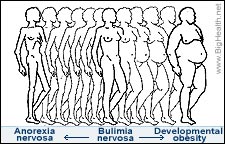Obsessing Over the Looks
We live in a society which considers thinness as beauty image. Due this fact, the desire of losing weight especially around women is so powerful that it results in serious nutritional diseases. Such alterations are anorexia nervosa and bulimia, conditions with a world wide lately growing incidence. In spite of the fact that a diet starts as a simple wish of losing weight, it can become out of control and the person becomes obsessed.

Anorexia nervosa
The word "anorexia" is originated from Greek meaning loss of appetite. The condition is a psychiatric diagnosis that describes an eating disorder characterized by low body weight and body image distortion with an obsessive fear of gaining weight.
Persons suffering with anorexia often control body weight by voluntary starvation, purging, vomiting, excessive exercise, or other weight control measures, such as diet pills or diuretic drugs and can resist eating for a long period of time. Usually they are restless and hyperactive, denying that they are too thin and eat just small. It is a complex condition, involving psychological, neurobiological, and sociological components.
There is no surprise declaring anorexia as extremely harmful to the organism. A person suffering from anorexia has several other digestive problems: ulcer, constipation, diarrhea, nausea, low pulse and blood pressure, growth anomalies and reduced intellectual performance. Some women have serious menstrual disorders even amenorrhea. Those who develop anorexia before adulthood may suffer stunted growth and subsequent low levels of essential hormones, including sex hormones and chronically increased cortisol levels. Osteoporosis can also develop as a result of anorexia in 38-50% of cases, as poor nutrition leads to the retarded growth of essential bone structure and low bone mineral density or it can lead to death.
The treatment is much easier when caught in early period but it needs the person’s full cooperation. It includes behavior therapy, supervised alimentation and supporting psychotherapy. When a person suffering from anorexia accomplished the treatment he/she can still be haunted by the idea of being overweight. In this case the moral support is extremely important; in the lack of it the person might relapse.
Bulimia is an eating disorder, considered to be a psychological condition in which the subject engages in recurrent binge eating followed by an intentional purging. This purging is done in order to compensate for the excessive intake of the food and to prevent weight gain, taking the form of vomiting, inappropriate use of laxatives, enemas, diuretics or other medication and excessive physical exercise.
A person suffering from bulimia can consume thousands of calories within an hour and then eliminate it trough purging. Some may consume up to 20000 calories at one meal. It usually appears at teenagers with good life conditions, educated but suffering from depression, anxiety, underestimating themselves.
Most persons suffering from bulimia are not obese, but they have a certain weight in excess. Like anorexia nervosa, it can produce a lot of serious complications like: stomach rupture, losing teeth, dehydration, unbalanced ions, and menstrual disturbances. Patients suffering from bulimia have also bigger saliva glands, and accuse of dispnea. In rare cases bulimia can lead to death.

Signs and symptoms
Anorexia nervosa:
• Diets in excess, the person in question is eating very little and is over preoccupied with fat and calories.
• Diminished menstruation.
• A fake body image.
• Great amounts of weight loss.
• Hyperactivity, overdone physical exercises.
• Depression, tormented lifestyle.
• Great amounts of weight loss.
Bulimia:
• The person is very eager to eat.
• The person is eating in hiding.
• Menstrual disturbances.
• Fluctuating body weight.
• Laxative abuse or the use of emetic substances.
• Physical changes: increased glands, losing teeth.
• Depression, tormented lifestyle.
If you suffer of anorexia or bulimia or know somebody who does, always keep in mind one thing: both conditions can be fixed quite easily, but only with a proper therapy, never on your own.

Freebies & Discount Codes
Find out freebies and coupons for savings on health products available on the Web



















